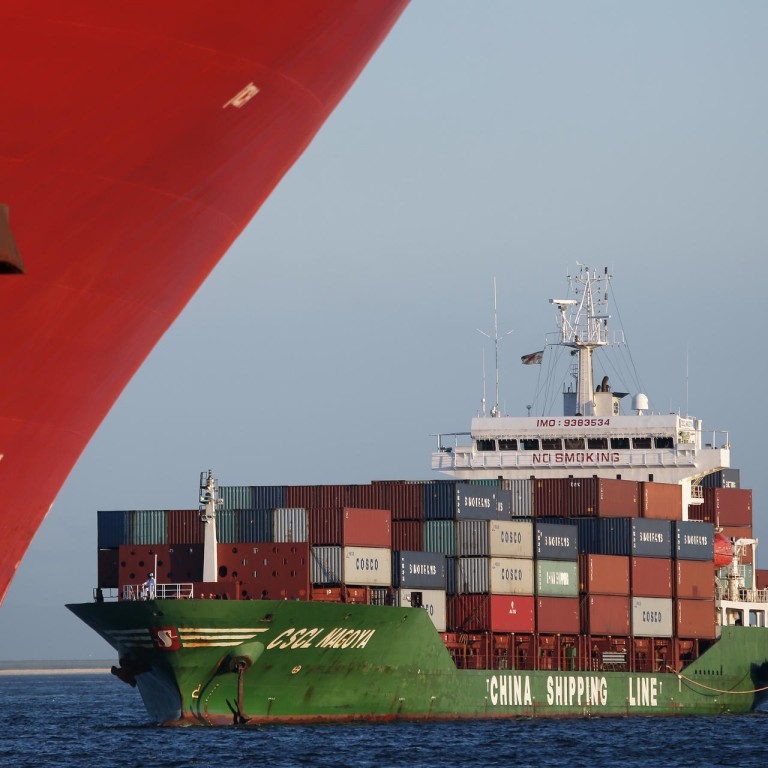
All aboard for 4-way battle on sea lanes
The fight for share of seaborne container trade gets more complicated as players form pacts, with Ocean Three the latest to pose challenge
The competitive landscape of the world's seaborne container trade is becoming more perplexing with the proposed formation of Ocean Three, the fourth shipping alliance in an increasingly consolidated industry.
France's CMA CGM, Shanghai-based China Shipping Container Lines and Dubai's United Arab Shipping Co confirmed their involvement in the planned Ocean Three cooperation agreement on Tuesday, following in the footsteps of 2M, G6 and CKYHE.
As a result, east-west container trades - which straddle the Asia-Europe, Asia-North America and Europe-North America trade routes, accounting for the bulk of world trade volumes - are set to see a four-way battle, if the United States regulatory body approves the pact.
The four consortiums together command 95.4 per cent of east-west trade capacity, according to Paris-based container shipping consultancy Alphaliner.
Ocean Three is expected to be approved by the Federal Maritime Commission as it is a looser pact than the other alliances, which are more exclusive.
The co-operation agreement has to wait at least 45 days for approval after it is submitted to the US regulator for review.
"Although there has been no formal filing of the new Ocean Three agreement, this alliance appears to have the structural flexibility, geographic diversity and operational balance that have previously led to the commission allowing effectiveness in the minimum amount of time," FMC commissioner Richard Lidinsky told the .
"After the document is formally filed, there will of course be follow-up questions that, if satisfactorily answered, could lead to prompt regulatory approval."
2M, which brings together Copenhagen-based Maersk Line and Geneva-based Mediterranean Shipping Co, the world's two largest container lines, is also likely to obtain US clearance, although possibly with an extended review period, as was reported by the last week.
G6 and CKYHE obtained the FMC's approval early this year.
UASC president and chief executive Jørn Hinge said Ocean Three would file the agreement with the US regulator "as soon as possible" as it planned to begin operation at the end of the year.
Approval from China and Europe will not be needed. The European Commission exempts container shipping consortiums that have a market share of up to 30 per cent from EU antitrust rules provided there is no price-fixing or collusion.
In China, carriers need only file a plan for joint operation with the Ministry of Transport, as slot exchanges and vessel-sharing agreements do not constitute a merger.
Merger activities are governed by the Ministry of Commerce, which rejected the more merger-like P3 Network between Maersk, MSC and CMA CGM.
After filing with the transport ministry, any single shipping line or alliance is prohibited from serving more than 30 per cent of the volume between Chinese ports and a particular overseas destination in any 12-month period, otherwise a probe will be initiated.
Still, a source close to the FMC said commissioner William Doyle planned to consult his Chinese counterparts on Ocean Three and P3 at the US-China bilateral maritime session to be held in Shanghai in November.
Shippers and cargo owners, on the other side of the business, said they had always objected to alliances.
"We are not opposed to slot exchanges or vessel-sharing, which help carriers to remain afloat. But we are against all kinds of exclusive alliances, which we think are for the eventual purpose of price-fixing and market manipulation," said Cai Jiaxiang, the vice-chairman of the China Shippers' Association and Asia Shippers' Council.
"At the moment, there is nothing we could do but see 2M and Ocean Three press ahead. I have suggested the Ministry of Transport start port data collection and monitoring as future reference to compliance with the 30 per cent cap. If after one year's operation the ratio is surpassed, we will file a complaint to the ministry for investigation."
Shipping lines have repeatedly said such alliances are purely operational and designed to cut costs, with member lines retaining independence in marketing and sales.
Igal Dafni, a partner at ILP Freight, a Hong Kong freight forwarding company that brokers sea, air and road cargoes, said he had seen a "pricing gap up to several hundred US dollars per teu quoted by different carriers in the same alliance for cargo to be shipped on the same vessel".

